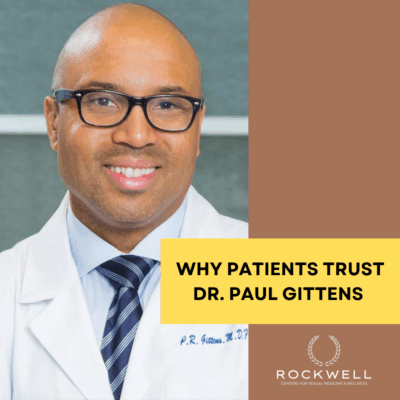Breast cancer therapies can save lives, but they often leave women facing unexpected challenges, including changes in sexual function. At Rockwell Centers for Sexual Medicine, we would like to change the narrative. Many women experience issues like reduced libido, vaginal dryness, pain during intimacy, or difficulty achieving arousal and orgasm. These effects can be physically and emotionally distressing, impacting relationships and overall quality of life.
In this blog, I will explore the types of breast cancer treatments, how they affect sexual health, and the range of solutions available—including both non-hormonal and hormonal options, as well as advanced treatments like the MonaLisa Touch®.
Breast Cancer Therapies and Their Impact on Sexual Function
The treatments for breast cancer often vary based on the cancer stage, type, and overall health of the patient. Here’s how common therapies can influence sexual function:
1. Surgery (Mastectomy or Lumpectomy)
- Surgery can affect a woman’s body image and self-confidence, leading to reduced sexual desire.
- Nerve damage from surgery may also reduce sensitivity in the breast area, a key erogenous zone for many women.
2. Chemotherapy
- Chemotherapy-induced menopause is a common side effect, especially in younger women. This abrupt menopause can cause:
- Vaginal dryness and thinning (vaginal atrophy).
- Hot flashes and night sweats that disrupt intimacy.
- Emotional side effects such as anxiety and depression.
3. Hormonal (Endocrine) Therapy
- Tamoxifen and aromatase inhibitors (e.g., letrozole, anastrozole, exemestane) block estrogen production or activity, crucial for treating hormone-sensitive breast cancers. However, they can also cause:
- Loss of natural lubrication.
- Vaginal discomfort.
- Reduced libido.
4. Radiation Therapy
- Radiation may lead to scar tissue formation and changes in breast sensitivity.
- It can also exacerbate vaginal dryness and general fatigue.
Treatment Options for Sexual Dysfunction After Breast Cancer
Addressing sexual health after breast cancer requires a personalized, multifaceted approach. Depending on the patient’s specific symptoms, these options that we offer at Rockwell Centers:
Lifestyle Changes
- Diet and Exercise
A healthy lifestyle supports overall wellness and can improve energy levels and libido.
Foods rich in omega-3s, antioxidants, and phytoestrogens may support vaginal health. - Stress Management
Mindfulness, yoga, or counseling can reduce stress and improve intimacy.
Non-Hormonal Treatments
Non-hormonal options are often the first choice for breast cancer survivors, particularly for those with hormone-sensitive cancers.
- Vaginal Moisturizers and Lubricants
- Products like Replens® or Sliquid® can restore moisture to the vaginal tissues.
- Silicone-based lubricants may reduce friction during intimacy.
- Pelvic Floor Therapy
- Working with a pelvic floor physical therapist can improve muscle tone and reduce pain during intercourse.
- Laser Therapy (MonaLisa Touch®)
- The MonaLisa Touch® is a non-invasive laser treatment that restores vaginal tissue by stimulating collagen production.
- This option can improve elasticity, lubrication, and comfort during intimacy.
Hormonal Treatments
In cases where hormonal therapies are safe and approved by a medical team, options include:
- Low-Dose Vaginal Estrogen
- Creams, rings, or tablets (e.g., Vagifem®) can safely treat vaginal dryness by delivering estrogen locally without significantly increasing systemic hormone levels.
- Testosterone Therapy
- In some cases, low-dose testosterone can boost libido, though its use in breast cancer survivors requires careful monitoring and depends on the specific type of breast cancer.
Psychological Support
- Counseling or Sex Therapy
- Working with a therapist can help address emotional barriers to intimacy.
- Partner-focused therapy can improve communication and rebuild connection.
Why Sexual Health Matters After Breast Cancer
At Rockwell Centers for Sexual Medicine, we believe sexual health is a vital part of overall well-being, yet it’s often overlooked in conversations about survivorship. Restoring intimacy can help women regain confidence, improve relationships, and enhance their quality of life.
At Rockwell Centers for Sexual Medicine, we specialize in helping breast cancer survivors overcome these challenges. From non-hormonal solutions to advanced treatments like the MonaLisa Touch®, we offer personalized care designed to meet your unique needs.
Optimizing Sexual Health Post-Treatment: Take the Next Step
If you’re experiencing sexual dysfunction after breast cancer therapies, you’re not alone—and effective solutions are available. Contact us today to learn more about our innovative, compassionate approach to sexual wellness. Together, we can help you reclaim intimacy and confidence.
To learn more about options for sexual health after breast cancer therapy, contact us at Rockwell Centers for Sexual Medicine.
This blog is designed to support survivors (our mothers, sisters, aunts, and grandmothers, and those who have undergone therapy by themselves) and empower them to seek the care they need for a fulfilling, confident, sexually healthy life after breast cancer.
Words of Interest
- Breast cancer sexual dysfunction
- Vaginal dryness after chemotherapy
- MonaLisa Touch for breast cancer survivors
- Non-hormonal treatments for vaginal dryness
- Libido after breast cancer treatment
- Hormonal therapy side effects intimacy
- Laser vaginal rejuvenation for breast cancer survivors













